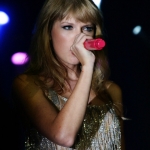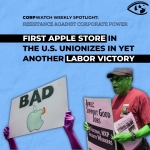US: Bush Top Gun vs. S.F. Activist
Solicitor General Asks High Court to Toss Anti-Nike Suit
WASHINGTON -- The Bush administration's top Supreme Court lawyer urged the high court Wednesday to toss out a San Francisco consumer activist's suit against Nike Inc. because it could discourage corporations from defending themselves in public against their critics.
Solicitor General Theodore Olson argued Wednesday that the court must quash
the lawsuit or citizens seeking to "advance their own agendas" would
repeatedly haul corporations into court to challenge their views.
"Anyone with a whim, a grievance and a filing fee can become a government-
licensed censor," Olson told the justices.
Marc Kasky sued Nike in 1998 under the state's false advertising laws,
accusing the world's largest shoemaker of making false and misleading public
statements about its treatment of hundreds of thousands of workers at Asian
factories that produce shoes and sportswear with the company's "swoosh" logo.
The California Supreme Court in May ruled 4-3 that Kasky has the right to
bring the case because Nike's claims amounted to an effort to "maintain and
increase its sales and profits" and should be treated as advertising, which is
regulated, instead of free speech, which is shielded against most such claims
under the First Amendment. Nike appealed the ruling, and the Supreme Court
agreed to review the case.
Laurence Tribe, the Harvard University law professor representing Nike,
said the case could have a chilling effect on the ability of a corporation to
present its side in public debates over labor issues and business practices.
"Nike was talking about the issue of how their presence in the Third World
exemplifies the pros and cons of globalization. They weren't pretending they
did everything right," Tribe told reporters after the arguments. "Maybe some
of the things they said were exaggerations. I don't know. But what I do know
is that in our society we do not trust judges to end the conversation by
saying, 'OK, I'll tell you (what is) the truth.' "
Kasky's attorneys said their client never sought to block Nike from airing
its views, merely to hold the company accountable for making false statements.
"This wasn't a debate about globalization. Nike has a right to engage in
that debate," said Patrick Coughlin, one of Kasky's attorneys. "But the fact
is that when they make specific representations about the conditions under
which their products are made that are false, well that's not OK, because
consumers rely on what companies say in purchasing products."
The justices appeared to be struggling with how to draw lines between
commercial speech -- statements designed to sell a product -- and
noncommercial speech, which the court has said deserves greater constitutional
protection. The justices repeatedly asked the attorneys where they would set
the boundaries.
Justice Stephen Breyer said Nike was probably "trying to sell a product and
trying to make a statement relevant to a public debate," adding the high court
might have a tough time separating the two motives.
The court will issue a ruling by the end of June. If the court rules in
Nike's favor, the suit will be dismissed without a trial.
Kasky, 59, the former executive director of the Fort Mason Foundation, has
previously sued Perrier, Pillsbury Foods and other companies for false
advertising. He became infuriated after reading a New York Times article in
1997 about an audit commissioned by Nike, which found that employees of one of
the company's contractors in Vietnam were being exposed to cancer-causing
toluene and suffering from a high rate of respiratory problems. He sued, he
said, to force the company to give up its California profits and to air ads
correcting alleged misstatements.
In his suit, he claimed that company press releases and remarks by its CEO,
Phil Knight, that Nike subcontractors were complying with wage, health and
safety regulations misled the public.
Nike has denied that any of its public statements were false or misleading.
But the company's main legal argument is that the statements are
constitutionally protected speech as part of a public dialogue, whether they
are true or not.
Much of Wednesday's 70-minute oral argument was devoted to whether Kasky
has standing as a private citizen to bring the case. Tribe suggested that the
San Francisco man suffered no harm from Nike's actions and had no legal
standing.
Kasky's attorneys, while acknowledging their client does not even own a
pair of Nike shoes, said he has the right to sue on behalf of the public under
California law even if he suffered no injury.
Nike's position is backed by a wide array of corporations as well as the
American Civil Liberties Union and the AFL-CIO. Forty major news organizations
also filed a brief in support of the athletic apparel and equipment company --
including Hearst Corp., which publishes The Chronicle.
Kasky's supporters included consumer and environmental groups, such as
Public Citizen and the Sierra Club. California Attorney General Bill Lockyer
and the attorneys general of 17 other states and Puerto Rico also filed a
brief backing his case.
Ronald Reiter, a California deputy attorney general, said consumers rely on
statements by companies about whether, for example, their tuna is caught in
"dolphin-safe" nets or whether workers are paid a fair wage.
"If companies lie about them, that should be treated as false advertising
and false product promotion, just as if they lied about how big something was
or how much it costs or what it could do," Reiter said.
- 180 Media & Entertainment
- 204 Manufacturing


